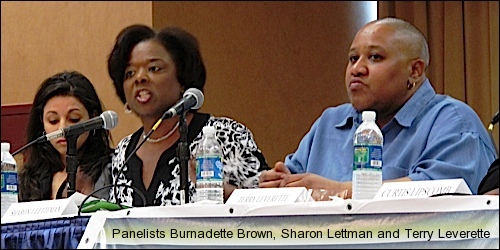by David Alire Garcia

DETROIT – The Rev. Wendell Anthony of Detroit's Fellowship Chapel proved an unlikely patron for a historic discussion of gay rights in the black community in downtown Detroit's Cobo Hall on April 30.
Part of the ninth annual Freedom Weekend founded by Anthony, the lively and at times heated discussion played out over a town hall meeting given this provocative title: "Is Gay the New Black?" An overwhelmingly black audience of approximately 200 people attended the forum. Anthony, the eight-term president of the Detroit NAACP chapter – the largest in the country – didn't answer the event's title question, but he strongly defended the decision to pose it.
"One of the things I heard is, 'Rev. Anthony, why would you dare have something like this? Is gay the new black? Are you out of your mind?'" he said at the start of the meeting. "No, I'm in my mind. We believe in thinking," he added.
The assembled panel was then invited to take turns at answering the meeting's namesake question.
"I would say being black and gay is the old black because the black LGBT community is the invisible 'Don't Ask, Don't Tell' staple of the black community," remarked Sharon Lettman, executive director of the National Black Justice Collation, a Washington, D.C.-based black LGBT advocacy organization.
Anthony Samad, a prominent columnist in the African-American press, criticized the question for ignoring black sensitivities – and for being imposed from outside.
"The mantra was developed by white activists to associate the gay movement with the black movement," said Samad, also a professor at East Los Angeles College. "It is offensive to most black people."
Only one member of the eight-member panel even entertained the possibility of answering the question in the affirmative: Rev. Horace Sheffield III of Detroit's New Galilee Baptist Church.
"I can see how it could be considered to be the new black in terms of who it is people in this country love to hate, just because of who they are," he said.
Charles Pugh, Detroit's first-ever openly gay city councilman and council president, was also a panelist. He pointed to his own electoral success last fall as proof of growing acceptance of gays and lesbians within the black community.
"Homophobia could have reared its ugly head in that campaign, but that did not become an issue," Pugh said, proudly ticking off the endorsements he received during the race from the Detroit Council of Baptist Pastors and the AME Ministerial Alliance.
The panel also included voices critical of any comparison between the LGBT community's current struggle for equality and the African-American community's civil rights struggle decades earlier.
"The gay agenda does not and cannot supersede the agenda for black people," said Minister Malik Shabazz, a Detroit community activist and leader of the New Black Panther Party.
"Can you define the gay agenda?" Pugh interjected. "Hold on Charles. This isn't a personal thing," Shabazz replied. "OK, but I still want to know," Pugh fired back.
Frankie Darcell of Mix 92.3 FM, who moderated the panel with Angelo Henderson from FM 105.7, asked why a gay person would want to "wear 'gay' on their forehead at work," saying it is inappropriate in the workplace.
Curtis Lipscomb of Detroit's KICK, the agency for LGBT African Americans, answered by saying, "It's not that we wear 'gay' on our foreheads, it's that we are who we are. I was fired because I am gay. Someone at work asked me if I was gay, and I answered honestly, 'yes,' and I was fired. What we want is simple equality."
Later, panelist Bernadette Brown, director of policy for the Triangle Foundation/Michigan Equality, the newly merged statewide LGBT advocacy organization, articulated her own shorthand gay rights agenda – complete with a Great Lakes State lament. "We want to be able to work and not lose our jobs because we're gay or lesbian," she said. "We want to be able to live somewhere and not be kicked out because we're LGBT, and in the state of Michigan that can happen."
On the issue of same-sex marriage, Samad asserted that socially conservative African Americans are being forced "to choose between (the gay rights) cause and their church." Disagreeing with Samad, Pugh argued that Christian leaders in the black community "need to be drawing gay people to church, to draw people to God and spirituality and a center." The comment was greeted by extended applause.
At several points during the discussion, Shabazz pointed to a problem he attributed to the growing acceptance of homosexuality in the black community.
"I'm very concerned about the number of sisters in our community who cannot find a black man to marry, a black man to be a father of their children," he said. "And it is wrecking our community."
"Sisters, you don't want to be married to a gay man. He will never be yours!" Lettman later responded.
As the discussion wound down, panelists offered ideas for continued progress.
"I would advocate more people to come out because we need more people just to be normal folk," Pugh said.
Lettman, meanwhile, cited the need to "create a healthy environment so that people don't have to go just on the down-low, but on the underground," she said referring to ex-U.S. Sen. Larry Craig and what she called "bathroom toe-tapping foolishness."
Brown summed up generational analysis that probably bodes well for the future of LGBT rights in the black community – and beyond – even if sounds harsh.
"We are really kind of waiting for a bunch of people to die," she said bluntly to a smattering of nervous laughter. "A lot of our solutions will happen when that happens, because the young people who are coming up – they get it."










